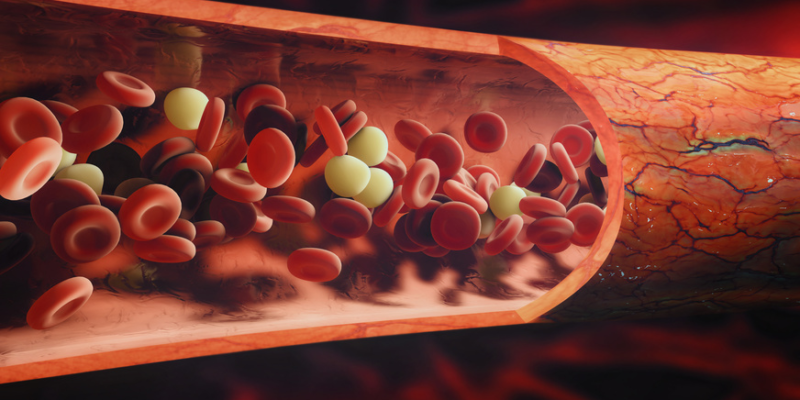Inactive Matrix Gla-Protein Is Associated With Arterial Stiffness in an Adult Population-Based Study (Pivin E, et al.)
Increased pulse wave velocity (PWV) is a marker of aortic stiffness and an independent predictor of mortality. Matrix Gla-protein (MGP) is a vascular calcification inhibitor that needs vitamin K to be activated. Inactive MGP, known as desphospho-uncarboxylated MGP (dp-ucMGP), can be measured in plasma and has been associated with various cardiovascular markers, cardiovascular outcomes, and mortality. In this study, published in the journal Hypertension, Swiss researchers aimed to learn more about MGP’s role in arterial stiffness, hypothesizing that high levels of dp-ucMGP are associated with increased PWV.

Researchers recruited participants via a multicenter family-based cross-sectional study in Switzerland, ultimately including 1001 participants in the analyses (475 men and 526 women). Dp-ucMGP was quantified in plasma by sandwich ELISA. Aortic PWV was determined by applanation tonometry using carotid and femoral pulse waveforms. Multiple regression analysis was performed to estimate associations between PWV and dp-ucMGP adjusting for age, renal function, and other cardiovascular risk factors.
Mean values were 7.87±2.10 m/s for PWV and 0.43±0.20 nmol/L for dp-ucMGP. PWV was positively associated with dp-ucMGP both before and after adjustment for sex, age, body mass index, height, systolic and diastolic blood pressure (BP), heart rate, renal function, low- and high-density lipoprotein, glucose, smoking status, diabetes mellitus, BP and cholesterol lowering drugs, and history of cardiovascular disease (P≤0.01).
“In conclusion, high levels of dp-ucMGP are independently and positively associated with arterial stiffness after adjustment for common cardiovascular risk factors, renal function, and age,” the researcher write.
While the team noted that further experimental studies are needed to determine whether vitamin K supplementation slows arterial stiffening by increasing MGP carboxylation, Katarzyna Maresz, PhD, president of the International Science and Health Foundation, expressed this is an important piece of a growing body of research strengthening the argument that Vitamin K2 is an essential nutrient for cardiovascular health.
“Research is never truly done – there is always more to discover and disprove. But this study highlights that high levels of inactive MGP (dpucMGP) are independently and positively associated with arterial stiffness. Couple these finding with the recently published intervention trial, which also used PWV measurements as well as ultrasound techniques, showing Vitamin K2 as MK-7 impacts arterial calcification, therefore improving arterial flexibility,” says Dr. Maresz. “Both studies are thoughtfully designed – using increased pulse wave velocity (PWV), which is the gold standard in assessing stiffening of the aorta – delivering a clearer picture of an important mechanism and health benefit.”
Reference: Pivin E, Ponte B, Pruijm M, Ackermann D, Guessous I, Ehret G, Liu YP, Drummen NE, Knapen MH, Pechere-Bertschi A, Paccaud F, Mohaupt M, Vermeer C, Staessen JA, Vogt B, Martin PY, Burnier M, Bochud M. Inactive Matrix Gla-Protein Is Associated With Arterial Stiffness in an Adult Population-Based Study. Hypertension. 2015 Jul;66(1):85-92.